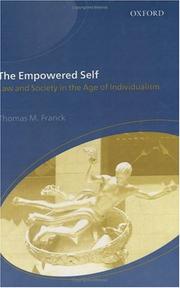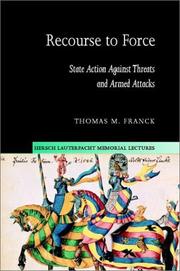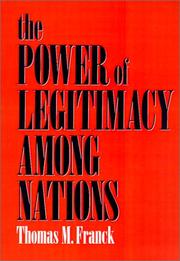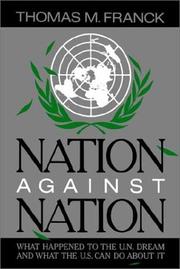| Listing 1 - 10 of 64 | << page >> |
Sort by
|

ISBN: 0198298412 9780198298410 Year: 1999 Publisher: Oxford Oxford University Press
Abstract | Keywords | Export | Availability | Bookmark
 Loading...
Loading...Choose an application
- Reference Manager
- EndNote
- RefWorks (Direct export to RefWorks)
Human rights --- Developmental psychology --- Legal theory and methods. Philosophy of law --- Identity (Psychology) --- Individualism --- Nationalism --- Citizenship --- Civil rights --- Group identity --- Citizenship. --- Civil rights. --- Group identity. --- Human rights. --- Individualism. --- Nationalism. --- Identity (Psychology).

ISBN: 0198259018 9780198259015 Year: 1995 Publisher: Oxford : Clarendon Press,
Abstract | Keywords | Export | Availability | Bookmark
 Loading...
Loading...Choose an application
- Reference Manager
- EndNote
- RefWorks (Direct export to RefWorks)
International law --- Fairness. --- Justice --- Philosophy. --- 341 --- Fairness --- -Justice --- Injustice --- Conduct of life --- Law --- Common good --- Law of nations --- Nations, Law of --- Public international law --- Impartiality --- Internationaal recht. Volkenrecht --(algemeen) --- Philosophy --- Justice. --- JusticeInternationaal recht. Volkenrecht --(algemeen) --- 341 Internationaal recht. Volkenrecht --(algemeen) --- Jurisprudence --- Natural law --- International law - Philosophy.
Book
ISBN: 0870782002 9780870782008 Year: 1986 Publisher: New York Priority Press
Abstract | Keywords | Export | Availability | Bookmark
 Loading...
Loading...Choose an application
- Reference Manager
- EndNote
- RefWorks (Direct export to RefWorks)

ISBN: 0521820138 0511020619 9780511020612 9780521820134 0511054637 9780511054631 0511177054 9780511177057 9780511494369 051149436X 9780521104203 0521104203 9786610430758 6610430756 1107126142 9781107126145 0511157959 9780511157950 0511309031 9780511309038 1280430753 9781280430756 Year: 2002 Volume: 15 Publisher: Cambridge Cambridge University Press
Abstract | Keywords | Export | Availability | Bookmark
 Loading...
Loading...Choose an application
- Reference Manager
- EndNote
- RefWorks (Direct export to RefWorks)
The nations that drafted the UN Charter in 1945 clearly were more concerned about peace than about justice. As a result, the Charter prohibits all use of force by states except in the event of an armed attack or when authorised by the Security Council. This arrangement has only very imperfectly withstood the test of time and changing world conditions. In requiring states not to use force in self-defence until after they had become the object of an actual armed attack, the Charter failed to address a growing phenomenon of clandestine subversion and of instantaneous nuclear threats. Fortunately although the Charter is very hard to amend, the drafters did agree that it should be interpreted flexibly by the United Nations' principal political institutions. In this way the norms governing use of force in international affairs have been adapted to meet changing circumstances and new challenges. The book also relates these changes in law and practice to changing public values pertaining to the balance between maintaining peace and promoting justice.
Intervention (International law) --- Self-defense (International law) --- #SBIB:327.5H00 --- #SBIB:340H88 --- International law --- Military intervention --- Diplomacy --- Neutrality --- Strategie en vredesonderzoek: algemeen --- Internationaal recht: rechten van de mens --- United Nations --- UNO --- Naciones Unidas --- Nations Unies --- ONU --- Organisation des Nations Unies --- Organizat︠s︡ii︠a︡ Obʺedinennykh Nat︠s︡iĭ --- OON --- Vereinigte Nationen --- Umot ha-meʼuḥadot --- Organizacja Narodów Zjednoczonych --- ONZ --- Forente nasjoner --- Forenede nationer --- FN --- Förenta nationerna --- Gaertʻianebuli erebi --- Organização das Nações Unidas --- PBB --- Perserikatan Bangsa-Bangsa --- Kokusai Rengō --- Kokuren --- ENSZ --- Egyesült Nemzetek Szövetsége --- Birleșmiș Milletler Teșkilâtı --- Birlăşmiş Millătăr Tăşkilatı --- Birlashgan Millatlar Tashkiloti --- BMT --- YK --- Yhdistyneet kansakunnat --- OUN --- Organizacija Ujedinjenih Nacija --- UN --- NU --- Nazioni Unite --- OSN --- Organizace spojených národů --- Sāzmān-i Milal-i Muttafiq --- Bangsa² Bersatu --- Organización de las Naciones Unidas --- Ühinenud Rahvaste Organisatsioon --- ÜRO --- Organismos tōn Hēnōmenōn Ethnōn --- Umoja wa Mataifa --- Vereinten Nationen --- Vereinte Nationen --- Hayʼat al-Umam al-Muttaḥidah --- Verenigde Naties --- VN --- Organizația Națiunilor Unite --- Um --- Lien ho kuo --- OKB --- Organizata e Kombeve të Bashkuara --- Lian he guo --- U.N. --- Umam al-Muttaḥidah --- OĒE --- Hēnōmena Ethnē --- Organizácia Spojených Národov --- Sahaprachāchāt --- Națiunile Unite --- Organizat︠s︡ii︠a︡ na obedinenite nat︠s︡ii --- Organismos Hēnōmenōn Ethnōn --- Manẓūmat al-Umam al-Muttaḥidah --- AAN --- Arhanizatsyi︠a︡ Ab'i︠a︡dnanykh Natsyĭ --- Nações Unidas --- Orhanizat︠s︡ii︠a︡ Ob'i︠e︡dnanykh Nat︠s︡iĭ --- O.Ē.E. --- ʻOngkān Sahaprachāchāt --- Sjuninejal Konob'laq --- Sāzmān-i Milal-i Muttaḥid --- Milal-i Muttaḥid --- Nėgdsėn U̇ndėstniĭ Baĭguullaga --- NUB --- Rāshṭrasaṃgha --- או״מ --- أمم المتحدة --- الأمم المتحدة --- سازمان ملل متحد --- 国際連合 --- 联合囯 --- 聯合國 --- United Nations Organization --- Liên Hiệp Quó̂c --- Liên Hợp Quó̂c --- LHQ --- Kula Samagga --- YūʼAṅʻnʻ --- 联合国 --- Организация Объединённых Наций --- Armed Forces. --- Agression (Droit international) --- Légitime défense (Droit international) --- Armed Forces --- Intervention (International law). --- Self-defense (International law). --- Aggression (International law) --- Intervention (Droit international) --- Организация на обединените нации --- Law --- General and Others

ISBN: 0195061780 9780195061789 Year: 1990 Publisher: New York Oxford University Press
Abstract | Keywords | Export | Availability | Bookmark
 Loading...
Loading...Choose an application
- Reference Manager
- EndNote
- RefWorks (Direct export to RefWorks)
Recognition (International law) --- Legitimacy of governments. --- International relations. --- Law of international organizations --- International relations --- Legitimacy of governments --- Relations internationales --- Légitimité des gouvernements --- Reconnaissance (Droit international)

ISBN: 0195035879 Year: 1985 Publisher: Oxford : Oxford University Press,
Abstract | Keywords | Export | Availability | Bookmark
 Loading...
Loading...Choose an application
- Reference Manager
- EndNote
- RefWorks (Direct export to RefWorks)
Book
ISBN: 0191683396 9780191683398 Year: 1997 Publisher: Oxford : Clarendon,
Abstract | Keywords | Export | Availability | Bookmark
 Loading...
Loading...Choose an application
- Reference Manager
- EndNote
- RefWorks (Direct export to RefWorks)
Professor Franck offers a compelling view of the future of international legal reasoning and legal theory. His critical analysis of the norms and institutions of modern international law inspires hope that advances will be made at all levels.
International law. --- Fairness. --- Justice. --- Injustice --- Conduct of life --- Law --- Common good --- Fairness --- Impartiality --- Justice --- Law of nations --- Nations, Law of --- Public international law
Book
ISBN: 0191707767 9780191707766 Year: 2001 Publisher: Oxford : Oxford University Press,
Abstract | Keywords | Export | Availability | Bookmark
 Loading...
Loading...Choose an application
- Reference Manager
- EndNote
- RefWorks (Direct export to RefWorks)
Examining gradual emancipation of the individual in national & international law, & changing attitudes towards personal choice in constituting identity, this text shows that this desire of persons for choice is not limited to Western industrial society.
Individualism. --- Identity (Psychology) --- Civil rights. --- Basic rights --- Civil liberties --- Civil rights --- Constitutional rights --- Fundamental rights --- Rights, Civil --- Constitutional law --- Human rights --- Political persecution --- Personal identity --- Personality --- Self --- Ego (Psychology) --- Individuality --- Economics --- Equality --- Political science --- Self-interest --- Sociology --- Libertarianism --- Personalism --- Persons --- Law and legislation
Book
ISBN: 0379207257 Year: 1982 Publisher: London
Abstract | Keywords | Export | Availability | Bookmark
 Loading...
Loading...Choose an application
- Reference Manager
- EndNote
- RefWorks (Direct export to RefWorks)
Civil rights --- -Basic rights --- Civil liberties --- Constitutional rights --- Fundamental rights --- Rights, Civil --- Constitutional law --- Human rights --- Political persecution --- Law and legislation --- Sociology of the developing countries --- Developing countries --- -Sociology of the developing countries

ISBN: 1280524405 019536287X 1423764234 160129753X 9781601297532 9780195362879 9781280524400 0195061780 9780195061789 9786610524402 6610524408 0197720242 Year: 2023 Publisher: New York : Oxford University Press,
Abstract | Keywords | Export | Availability | Bookmark
 Loading...
Loading...Choose an application
- Reference Manager
- EndNote
- RefWorks (Direct export to RefWorks)
An authority on international law considers why it is that rules within the international system are for the most part obeyed, even though they are not usually enforced. The text uses practical examples to show how international law works successfully even without formal codes or laws.
Recognition (International law) --- Legitimacy of governments. --- International relations. --- De facto doctrine (International law) --- De facto government --- Estrada doctrine --- Nonrecognition of governments --- International law --- De facto doctrine --- State succession --- Governments, Legitimacy of --- Legitimacy (Constitutional law) --- Consensus (Social sciences) --- Revolutions --- Sovereignty --- State, The --- General will --- Political stability --- Regime change --- Coexistence --- Foreign affairs --- Foreign policy --- Foreign relations --- Global governance --- Interdependence of nations --- International affairs --- Peaceful coexistence --- World order --- National security --- World politics
| Listing 1 - 10 of 64 | << page >> |
Sort by
|

 Search
Search Feedback
Feedback About UniCat
About UniCat  Help
Help News
News